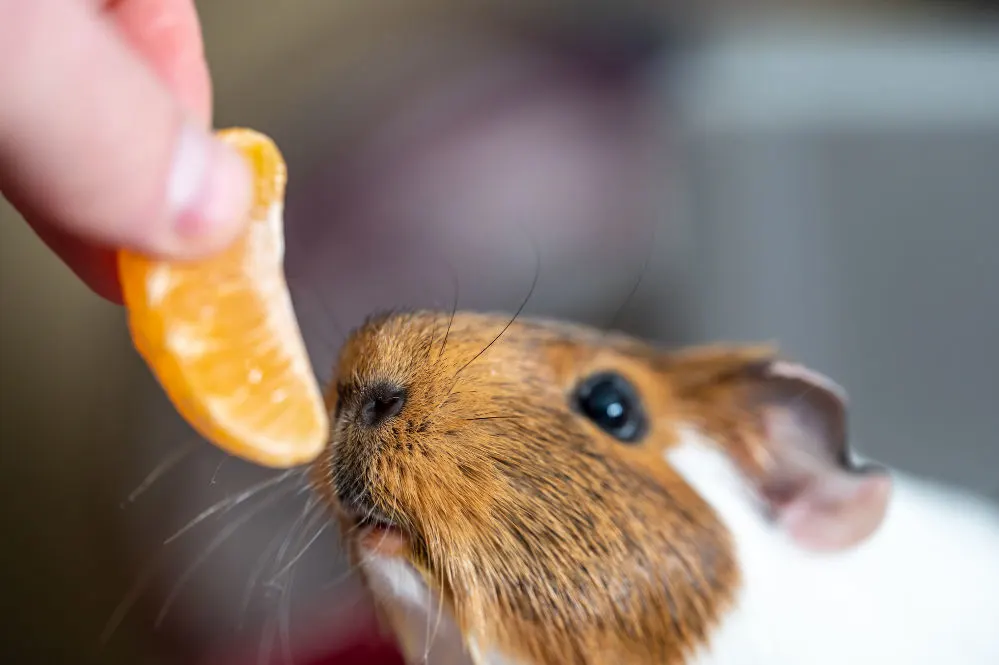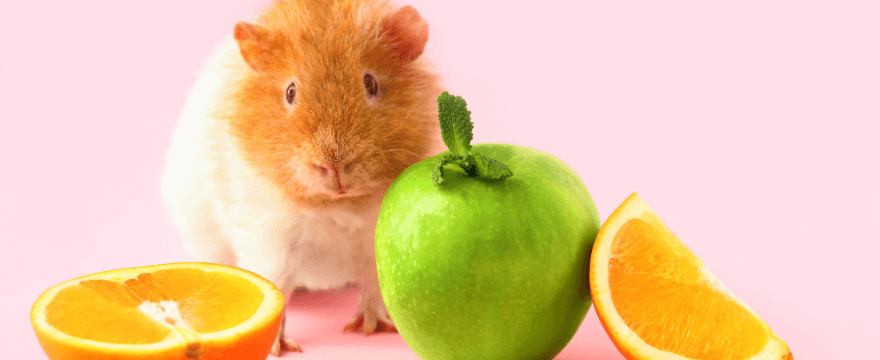You have a fluffy little guinea pig named Popcorn. He looks at you with those big, loving eyes and begs to eat your juicy orange. Can you resist those begging looks? The internet says “yes,” but also warns about “citrus dangers.” So, what’s the real deal? Can guinea pigs have oranges, or will it upset their stomachs?
How to Safely Feed Oranges to Your Guinea Pig?

Guinea pigs are cute little animals that require a well-rounded diet to stay healthy. Although hay and pellets are the main food sources for guinea pigs, some pet owners may question whether giving them a juicy orange slice is a nutritious treat. Let’s explore the world of guinea pigs and oranges, discussing the advantages and possible drawbacks of this citrusy treat.
Let’s take a look at guinea pigs and oranges, and see what the benefits and drawbacks are.
Yes, Oranges Offer a Vitamin C Boost!
Guinea pigs rely on Vitamin C in their diet since they can’t produce it themselves, unlike humans.
Oranges are an excellent source of this essential nutrient, playing a crucial role in:
- Preventing scurvy: Ensuring your pet’s diet includes enough Vitamin C is essential. This serious and potentially life-threatening condition can weaken their immune system, bones, and teeth.
- Supporting overall health: Vitamin C plays a crucial role in promoting wound healing, aiding digestion, and facilitating the absorption of other nutrients.
Beyond Vitamin C: A Multivitamin Treat

Oranges are not only rich in Vitamin C but also contain a variety of other essential vitamins and minerals:
- Vitamin A: Essential for maintaining optimal eye health, supporting growth, and reproductive functions.
- Potassium: helps maintain blood pressure and supports nerve and muscle function.
- Calcium: supports the development of strong bones and teeth.
But Remember, Moderation is Key!
It’s important to consume oranges in moderation, despite their numerous benefits. High sugar content can result in digestive problems such as bloating and diarrhea. Moreover, an excess of sugar may lead to increased body weight and various health issues.
Balancing the Benefits and Risks:
Here are some important things to keep in mind when thinking about feeding oranges to your furry friend:
- Small portions: Provide a small portion (similar to the size of a large pea) once or twice weekly.
- Fresh is best: Steer clear of orange products that are processed and contain added sugars or preservatives.
- Remove the peel: It needs to be removed. Peels may pose challenges for digestion and could potentially have pesticide residue.
- Monitor closely: Keep an eye out for any differences in your guinea pig’s behavior or droppings once oranges are added to their diet.
- Consult your vet: For any worries you may have, it’s best to seek guidance from a professional for tailored recommendations.
Beyond Oranges: Exploring Other Tasty Treats
Although oranges can be given as a treat, it’s crucial to provide a mix of nutritious fruits and vegetables in addition to their usual diet.
Here are some safe and delicious alternatives:
- Red, green, and yellow bell peppers
- Strawberries are a delicious and juicy fruit.
- Blueberries are a delicious and nutritious fruit.
- Cucumber
- Romaine lettuce
Frequently Asked Questions(FAQ’s)
How Much Orange Can I Give My Guinea Pig?
Little nibbles, huge advantages! Stick to giving only 1-2 small pieces, 1-2 times a week. Consider a unique dessert option, not a regular one.
Can Guinea Pigs Eat Oranges with Skin

Uncover the truth! Although some believe that organic, washed peel is safe, it may be difficult to digest. A safer snack option is to avoid the peel and seeds, which can be choking hazards.
Why is My Guinea Pig’s Pee Orange?
This question is unrelated to the orange debate and needs urgent veterinary care. Orange urine may be a sign of underlying health problems. Seek advice from a professional as soon as possible!
Are oranges safe for guinea pigs to eat? The answer is a happy “yes,” but with caution! In moderation, you can enjoy these citrus treats—which are delicious and packed with vitamin C.

Leave a Reply